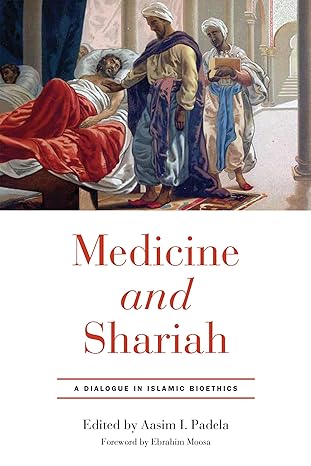An Introduction to the Field of Islamic Bioethics (Self-Paced)
Course

About The Course
An Introduction to the Field of Islamic Bioethics: A Self-Paced Course is designed to provide learners with a comprehensive understanding of Islamic bioethics at their own pace. This self-paced course delves into the discourse of Islamic bioethics to cover fundamental concepts, methodologies, and material of the field. Whether you are a healthcare professional, scholar, or student, this course equips you with the essential knowledge and literacy to navigate the various materials of Islamic bioethics.
Islamic bioethics is a field that bridges traditional Islamic sciences with modern medical and ethical dilemmas, offering a unique perspective that is both relevant and deeply rooted in Islamic morality. Through a series of meticulously structured modules, learners will explore the actors and discursive methods of the discourse and will gain in- depth insight into Islamic bioethical deliberations related to brain death, organ donation, abortion, and reproductive technologies.
This self-paced format allows you to engage with the course material on your own schedule, providing the flexibility to comprehend and apply the concepts discussed thoroughly. Each session is enriched with case studies, scholarly discussions, and practical applications to ensure that you not only grasp the theoretical aspects but also the application of Islamic bioethical principles in real-world scenarios.
Importantly, this course is distinct from our Fiqh of Medicine course; it offers an academic engagement with the discourse and plurality of views that seeks to equip learners with insights and skills to improve Islamic bioethical deliberation. By the end of this course, you will have a solid foundation in the discourse and methods of Islamic bioethics as well as key insights into the juridical views on pressing bioethical issues.
Embark on this educational journey to deepen your knowledge of Islamic bioethics and enhance your ability to address ethical challenges confidently, insha’Allah. 
At A Glance
 10 Recorded Sessions
10 Recorded Sessions
2.5 hours of student work with readings and 2 – 4 videos per module. 10 Graded Module Assessments
10 Graded Module Assessments  20+ VIDEO HOURS
20+ VIDEO HOURS  Course Duration: 6 months
Course Duration: 6 months  Course Content Access Duration: 9 months
Course Content Access Duration: 9 months  Office/Consultation Hours: 7.5 hours over the 6 months term
Office/Consultation Hours: 7.5 hours over the 6 months term  Access to Mobile App
Access to Mobile App  Live Q&A
Live Q&A  Digital Certificate
Digital Certificate
SESSIONS INFORMATION
- Monthly Consultation Sessions: 5 (of 1.5 Hr's duration each)
Consultation Consultation Sessions: Sundays, 4:00PM – 5:30PM London (10:00AM – 11:30AM Chicago time) - First Session will be Orientation Session: Sun, 19 Jan 25 (Introduction To the Course)
Dates of Consultation Sessions
- Sunday, 16 February 2025
- Sunday, 20 April 2025
- Sunday, 18 May 2025
- Sunday, 15 June 2025
Enroll Now
- Course Launch Date : 19th January 2025
- Course Fee:
Pay in Full:£119.99£99.99
Pay in 4 Installments: £29.99
Al Balagh Scholarship
AlBalagh Scholarship is available for learners who cannot afford the fee. Learn More and Apply
Course Overview
Islamic bioethics is a rapidly growing field that deals with ethical issues at the intersection of Islamic morality and contemporary healthcare. This self-paced course, designed for healthcare professionals, scholars, and students, delves into the foundations of Islamic bioethics and its application to real-world dilemmas such as brain death, organ donation, abortion, and reproductive technologies.
Course Aims & Objectives
The Introduction to the Field of Islamic Bioethics course will focus on the following key themes:
- Comprehensive Understanding of Islamic Bioethics:
- Developing a foundational understanding of Islamic bioethical principles, methodologies, and their application to contemporary medical challenges. This includes examining topics such as brain death, organ donation, abortion, and reproductive technologies through the lens of Islamic jurisprudence (Fiqh).
- The course will emphasize the role of Shariah, qawaid (legal maxims), Maqasid (objectives of Shariah), and usul (jurisprudence principles) in shaping bioethical decisions.
- Integration of Classical Islamic and Modern Medical Ethics:
- Gaining specialized knowledge in Islamic moral epistemology and its application to real-world medical scenarios. The course will allow students to engage with classical Islamic teachings alongside contemporary medical ethics, fostering a deep understanding of the intersections between Islamic jurisprudence and modern medical practices.
- Students will explore how Islamic bioethics integrates traditional values with contemporary medical dilemmas, including how it addresses modern ethical challenges in healthcare.
Learning Outcomes
By the end of this course, participants will be able to:
- Understand Islamic Bioethics Fundamentals: Define Islamic bioethics and distinguish it from other ethical frameworks. Identify the primary actors and consumers in Islamic bioethics discourse.
- Examine Research Methods in Islamic Bioethics: Analyse the cognitive biases, methods, and limitations of fatwa research, Medline reviews, and usuli approaches to understanding bioethical perspectives.
- Explore Islamic Moral Epistemology: Understand the Islamic sources of moral and ethical reflection, and differentiate between “Islamic” and other ethical perspectives in bioethics.
- Analyze Islamic Law and Bioethics: Learn how qawaid, Maqasid, and usul form the basis of Islamic bioethical rulings and understand the role of jurists in bioethical deliberation.
MODULES
Module 1
Introduction and Course Overview
Module 2
Research Methods, Outputs & Producer Roles in Islamic Bioethics
Module 3
An Introduction to Islamic Moral Epistemology
Module 4
Islamic Law & Bioethics
Module 5
Character Development and Islamic Bioethics
Module 6
Contestations over Stakeholder Roles in Islamic Bioethical Discourse
Module 7
Islamic Bioethics of Brain Death & End-of-Life Healthcare Ethics
Module 8
Islamic Bioethics of Organ Donation and Transplantation
Module 9
Islamic Bioethics of Abortion & Human Reproduction
Module 10
Islamic Bioethics: A Review
Here is the course outline:
Welcome Aboard: Course IntroductionWelcome Aboard: Course Introduction |
LMS OrientationLMS Orientation |
FAQsFAQs |
Consultation Sessions |
Session 1: Introduction and Course Overview |
Session 2: Research Methods, Outputs & Producer Roles in Islamic Bioethics |
Session 3: An Introduction to Islamic Moral Epistemology |
Session 4: Islamic Law & Bioethics |
Session 5: Character Development and Islamic Bioethics |
Session 6: Contestations over Stakeholder Roles in Islamic Bioethical Discourse |
Mid-Course Survey |
Session 7: Islamic Bioethics of Brain Death & End-of-Life Healthcare Ethics |
Session 8: Islamic Bioethics of Organ Donation and Transplantation |
Session 9: Islamic Bioethics of Abortion & Human Reproduction |
Session 10: Islamic Bioethics: A Review |
Post-Course Survey |
Completion
The following certificates are awarded when the course is completed:
 |
CoA-Islamic Bioethics |




(3).png?lmsauth=401bc9a751a1384a01d518931aef05980231a962)
.jpeg?lmsauth=20c38b738ae72dadfffc864a114a427f837cf07e)
